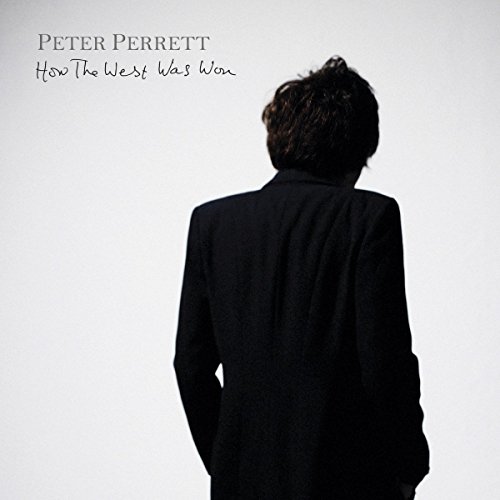
Peter Perrett
How the West Was Won
Release Date: Jun 30, 2017
Genre(s): Pop/Rock, Alternative/Indie Rock
Record label: Domino
Music Critic Score
How the Music Critic Score works
Buy How the West Was Won from Amazon
Album Review: How the West Was Won by Peter Perrett
Excellent, Based on 8 Critics
Based on rating 5/5
Against the grain of punk, The Only Ones recorded some of the late 70s' most gloriously transcendent rock'n'roll music, but they crashed and burned in spectacular fashion. Crawling from the wreckage, frontman Peter Perrett retreated into a reclusive isolation which wiped out most of his next decade. He re-emerged with '96's fair-to-middling solo debut Woke Up Sticky, but an intended post-LP hiatus again lapsed into a lengthy hibernation.
Based on rating 8/10
Not many artists wait until they're 65 to release a debut solo album, but that is what we have here. Peter Perrett had a dose of fame in the late '70s as frontman of English rock band the Only Ones, best remembered for their signature tune "Another Girl, Another Planet," but that underrated band split in 1982, and a subsequent reunion in 2007 didn't amount to much (nor did his short-lived '90s band the One). And given Perrett's well-known substance abuse problems, it feels lucky that he's still here. The fact that he has re-emerged with such a compelling record can be termed a shock, but it's a pleasant one.
Based on rating 4/5
T en years ago, the Only Ones announced they were reforming. Even in a world in which legendary bands are hardly ever allowed to rest in peace without being cajoled back to the stage for a final encore, this seemed a startling turn of events. It wasn't just the acrimony with which the Only Ones had split up, fuelled by drugs and the failure of even their most famous single, 1978's transcendent Another Girl, Another Planet, to make much commercial impact.
Based on rating 4/5
In 1978, Peter Perrett started his best-known song with the statement, "I always flirt with death." Almost 40 years later, on his first and somewhat surprising studio recording since the 90s, the English singer/songwriter sings, "But I didn't die, at least not yet." Between that first song (Another Girl, Another Planet, released by Perrett's power-pop band the Only Ones) and the new one (Something In My Brain), Perrett has led a storied life of drugs and seclusion, devotion and romanticism. How The West Was Won opens with the title track, a critique of U.S. politics and culture wherein Perrett admits to appreciating Kim Kardashian and J.Lo.
Based on rating 8/10
The tale of Peter Perrett seemed destined for tragedy. After the glory of the Only Ones, the singer descended into a years-long battle with drug addiction that saw him surfacing for air regularly -- even releasing a very good album with his band the One in 2005 -- but then going back under, leaving fans to assume that they next time they heard his name, it would be in an obit. Luckily for all involved, Perrett cleaned up in the mid-2010s and got it together enough to record and release his first solo album.
Based on rating 7.2/10
To make a successful comeback album is to walk the narrowest of tightropes: artists have to retain their central appeal without rehashing their glory days, sound current without pandering and fundamentally prove their relevance to a world that's moved on just fine without them. That ex-Only Ones frontman Peter Perrett is making his big comeback play at 65 is surprising. That he's now defiantly sober is even more surprising.
Based on rating 3/5
Like a punk Kevin Rowland, Peter Perrett is one we almost lost. Since The Only Ones split in 1982, singer Perrett has descended into bouts of heroin and crack-induced reclusiveness that would last decades at a time; his debut solo album emerges as Perrett hits 65, twenty-one years after his last album with The Ones. And while its takes on classic swing, psych country and postpunk pop are understandably fragile and lacking wallop - an inevitable consequence of age and getting your kids in your backing band - How The West Was Won is shot through with a wonderfully wry reinvigoration.
Opinion: Very Good
I first heard Peter Perrett sing with The Only Ones late at night, long after he had released the records that first made a case for his genius, and many years before this new one. The setting was Nicky Campbell's tactical deployment of 'Another Girl, Another Planet' in the middle of an interview with David Icke at a time, hard as it is to now imagine, when this unholy union of egotists was broadcast on Radio 1 as an exclusive meeting of minds. Between Icke claiming (quite convincingly, if taken on his own delusional terms) that he was Jesus, and that Campbell was the reincarnation of Jim Morrison, I underwent an epiphany that was only partly musical, the clownish talk in the studio leaving me unprepared for the actual transcendence provided by the music.
'How the West Was Won'
is available now

